Timing Protein
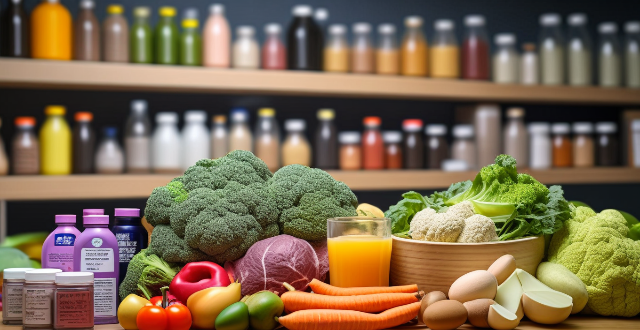
What role does timing play in consuming nutrients around workouts ?
Timing is crucial for nutrient intake around workouts to maximize benefits and improve health. Pre-workout meals should include carbs, protein, and healthy fats, while staying hydrated is essential. During long workouts, snacks and sports drinks can maintain energy and prevent dehydration. Post-workout recovery focuses on replenishing glycogen stores with carbs, supporting muscle repair with protein, and rehydrating. Proper timing of meals and snacks before, during, and after exercise optimizes workout benefits and overall fitness.

How much protein do I need for muscle recovery ?
Protein is vital for muscle recovery, especially after intense workouts. Sedentary adults need 0.8g/kg, while athletes require more. Timing and quality of protein intake matter. Tips include dietary variety, supplementation if needed, meal planning, and monitoring intake.

What is the ideal meal timing for optimal sports performance
The ideal meal timing for optimal sports performance is crucial for athletes to maximize their potential. Proper nutrition can help improve endurance, strength, and overall performance during physical activities. Key points to consider when planning meals include eating a pre-workout meal containing carbohydrates, protein, and healthy fats 2-3 hours before exercise; staying hydrated throughout the day; consuming simple carbohydrates during longer workouts; eating a post-workout meal rich in protein and carbohydrates within 30 minutes after exercising; and avoiding eating too close to workout time. By following these guidelines, athletes can ensure they have the necessary fuel for their bodies to perform at their best.

Is it necessary to follow a high-protein diet for strength training
A high-protein diet can be beneficial for strength training, but it is not absolutely necessary as long as enough protein is consumed to support muscle growth and repair. Reasons for a high-protein diet include muscle repair and growth, increased metabolism, satiety, and improved recovery. However, the amount of protein needed varies based on individual factors, and general guidelines for intake during strength training are 0.8-1.2 grams per kilogram of body weight, with a source of protein consumed within 30-60 minutes after a workout. High-quality sources of protein should also be chosen.
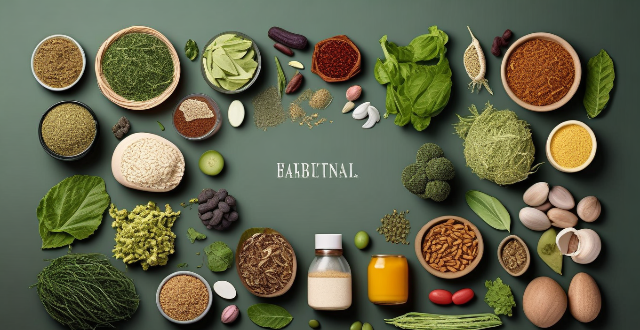
What role does protein play in a healthy diet ?
Protein is an essential nutrient that plays a crucial role in maintaining a healthy diet. It contributes to tissue growth and repair, enzyme and hormone production, immune system function, fluid balance, and energy provision. Consuming a variety of protein sources is important to ensure all necessary amino acids are obtained.

How can I ensure that I'm getting enough protein in my diet ?
Protein is crucial for muscle growth, hormone regulation, and immune support. To ensure you get enough, calculate your needs, choose quality sources like lean meats and legumes, include protein in every meal, snack smartly, read nutrition labels, and consider supplements if needed. Variety and quality are key.
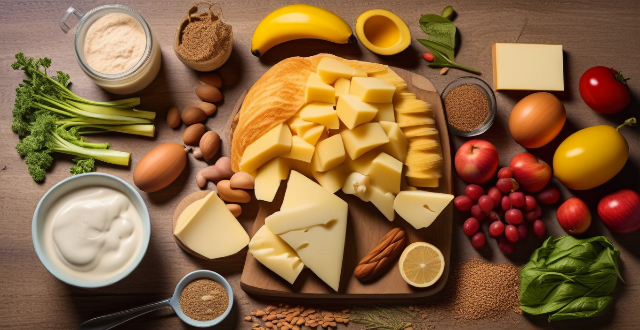
What are the best sources of lean protein for breakfast ?
Including lean protein in your breakfast can help you feel fuller for longer and reduce the likelihood of overeating later in the day. Some of the best sources of lean protein for breakfast include eggs, Greek yogurt, cottage cheese, tofu, nut butters, quinoa, turkey bacon, chia seeds, edamame, and roasted chickpeas. These foods are high in protein and other essential nutrients like calcium, fiber, and healthy fats. They can be prepared in various ways and combined with other ingredients to create a balanced and satisfying breakfast.

How do I balance protein and carbohydrates in my breakfast ?
Balancing protein and carbohydrates in your breakfast is essential for maintaining a healthy diet. Here are some tips on how to achieve this balance: 1. Choose a protein source (e.g. eggs, Greek yogurt, cottage cheese, tofu, nut butter). 2. Add complex carbohydrates (e.g. whole grain bread or toast, oatmeal, fruits, vegetables). 3. Incorporate healthy fats (e.g. avocado, nuts, seeds, olive oil). 4. Consider portion sizes and use measuring cups or a food scale if needed. 5. Plan ahead by prepping ingredients or preparing meals in advance. 6. Be mindful of added sugars and choose whole, unprocessed foods whenever possible.
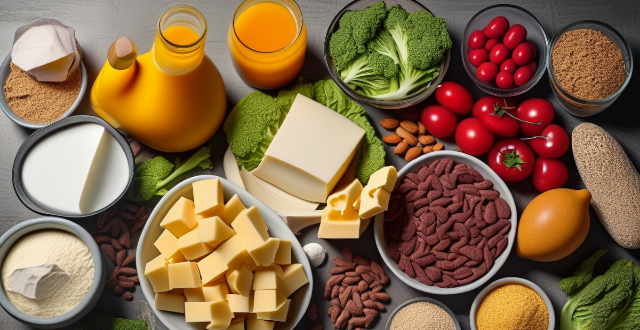
How can I make my breakfast more protein-packed ?
To make your breakfast more protein-packed, start with a high-protein base like eggs or Greek yogurt. Add nuts and seeds for extra protein and healthy fats. Incorporate legumes such as chickpeas or lentils into savory breakfast dishes. Don't forget dairy products like milk and cheese for added protein. Get creative with grains by combining them with other protein sources like overnight oats with Greek yogurt and nuts. By using these strategies, you can increase the protein content of your morning meals while keeping them interesting and satisfying.

Are there any specific dietary recommendations for endurance athletes
Dietary recommendations for endurance athletes include consuming a higher intake of complex carbohydrates, adequate protein for muscle repair and recovery, healthy fats for energy, proper hydration, meeting increased needs for micronutrients, timing meals and snacks for optimal performance, and individualizing dietary needs based on personal factors.

How important is nutrition in optimizing athletic performance at a competitive level ?
Nutrition is crucial for athletic performance, providing energy, aiding recovery, and maintaining health. Key aspects include consuming carbohydrates for energy, proteins for muscle repair, staying hydrated, obtaining necessary micronutrients from a varied diet, timing nutrient intake around exercise, and personalizing nutrition plans. These practices help athletes maximize their training and competitive outcomes.

How should I incorporate sports nutrition supplements into my daily routine for optimal results ?
The text provides a comprehensive guide on how to incorporate sports nutrition supplements into your daily routine for optimal results. It starts with understanding the basics of sports nutrition and assessing individual goals and needs. It then discusses different types of supplements, their timing of intake, and how to incorporate them into various parts of the day. The text emphasizes the importance of monitoring and adjusting supplement use based on personal experiences and advises consulting with a professional for personalized advice.

What kind of diet is recommended for women who want to lose weight through exercise ?
Recommended diet for women who want to lose weight through exercise includes lean protein, complex carbohydrates, healthy fats, and plenty of water. It's important to eat a light meal or snack before workouts and refuel with protein and carbohydrates after exercising. Portion control and avoiding empty calories are also crucial for weight loss success.

Are there any buy-one-get-one-free offers at nearby restaurants ?
This article provides a detailed overview of buy-one-get-one-free offers at nearby restaurants. It lists the top 5 local eateries offering such deals, including their location, specific offer details, and timing. The article also explains how to avail these promotions by choosing a favorite restaurant, checking the timing, ordering accordingly, and enjoying the meal. Overall, it encourages readers to take advantage of these offers for a delicious dining experience without spending too much.

Will there be any promotions or discounts for the new product ?
Will there be any promotions or discounts for the new product? The answer depends on various factors such as market strategy, competitive landscape, financial considerations, and timing. Marketing plan, target audience, competitor analysis, market share, profit margins, sales goals, product launch timing, and inventory management are all key factors to consider. It is essential to keep an eye on these factors to determine if there will be any promotions or discounts available for the new product.

Can technology be used to enhance fairness in sports competitions ?
The text discusses the role of technology in enhancing fairness in sports competitions. It mentions video replay and review systems, advanced timing systems, biological passports, and wearable technology as some of the ways technology can be used to ensure a level playing field for athletes and promote fair competition. The text concludes that technology has a significant role to play in enhancing fairness in sports competitions and will continue to evolve to promote fair competition and preserve the integrity of sports worldwide.

How do sports photographers capture the beauty and emotion of athletic events ?
**How Sports Photographers Capture the Beauty and Emotion of Athletic Events** 1. **Understanding the Sport**: Research and anticipation help photographers capture key moments. 2. **Equipment Choices**: Appropriate lenses, high-speed cameras, and stabilizing devices are essential. 3. **Positioning**: Unique angles, perspectives, and clean backgrounds enhance photos. 4. **Timing and Composition**: Precise timing and thoughtful composition are crucial. 5. **Lighting**: Natural and artificial lighting affect photo quality. 6. **Emotion and Storytelling**: Capturing emotions and telling stories through images is impactful. 7. **Post-Processing**: Editing and selecting the best shots is part of the process. 8. **Ethics and Professionalism**: Respect and professionalism guide sports photographers in their work.

Does the timing of exercise (morning vs. evening) affect its impact on mental health ?
The timing of exercise can have a significant impact on its effects on mental health. Morning exercise boosts mood, energy, and productivity, while evening exercise reduces stress and promotes relaxation. However, morning exercise may be difficult to stick to for some people and can cause fatigue later in the day. Evening exercise may interfere with sleep and be less consistent due to unforeseen events. Ultimately, the best time to exercise depends on individual preferences and lifestyle factors.
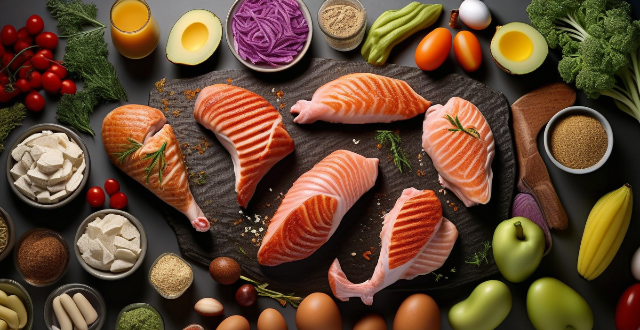
What are some good sources of protein for a fitness meal plan ?
Including protein-rich foods like chicken breast, salmon, eggs, Greek yogurt, and quinoa in a fitness meal plan can support muscle building and fat loss goals.
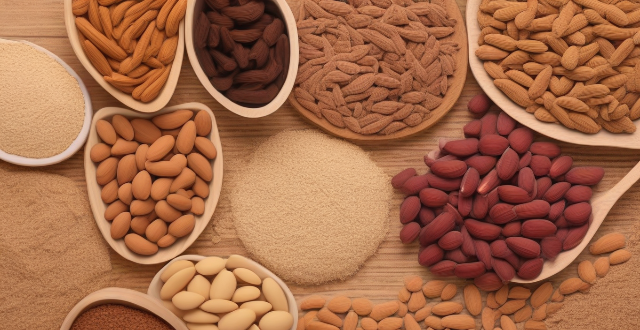
What are some low-calorie protein sources that are also high in fiber ?
Low-calorie protein sources that are also high in fiber include lentils, chickpeas, quinoa, edamame, almonds, chia seeds, black beans, artichokes, and peas. Incorporating these foods into your diet can help you achieve your weight loss goals while providing your body with the nutrients it needs to function properly.

What are the best practices for sports nutrition in managing a healthy lifestyle ?
Sports nutrition is key to managing a healthy lifestyle. Best practices include staying hydrated, eating a balanced diet with carbohydrates and protein, choosing healthy fats, timing meals around workouts, using supplements cautiously, and prioritizing recovery through rest and proper post-workout nutrition. Consulting with a registered dietitian or healthcare professional can provide personalized advice.

What are some unique and healthy breakfast ideas ?
The given text provides a list of eight unique and healthy breakfast ideas, each offering a combination of nutrients to kickstart the day. Here's a brief summary: 1. **Avocado Toast**: A wholesome blend of whole grain bread, avocado, eggs, tomatoes/cucumbers, and chia seeds for added nutrition. 2. **Overnight Oats**: A mix of oats, almond milk, Greek yogurt, mixed berries, and honey or maple syrup for a sweet and protein-rich start. 3. **Veggie Scramble**: Incorporates various vegetables, turkey bacon, egg whites, and a whole grain wrap for a fiber-rich meal. 4. **Breakfast Quinoa Bowl**: Features quinoa, almond butter, bananas, chopped nuts, and a drizzle of honey for a protein-packed breakfast. 5. **Protein Pancakes**: Made with whole wheat flour, Greek yogurt, blueberries or chocolate chips, maple syrup, and peanut butter for a fun twist on traditional pancakes. 6. **Breakfast Burrito**: Combines a whole wheat tortilla, scrambled eggs, black beans, avocado or salsa, and shredded cheese for a filling meal. 7. **Breakfast Salad**: Includes mixed greens, hard boiled eggs, crumbled bacon, diced tomatoes, and a balsamic vinaigrette dressing for a light yet protein-rich option. 8. **Chia Seed Pudding**: A mixture of chia seeds, coconut milk, fresh fruit, chopped nuts, and dark chocolate shavings for a creamy and indulgent breakfast.
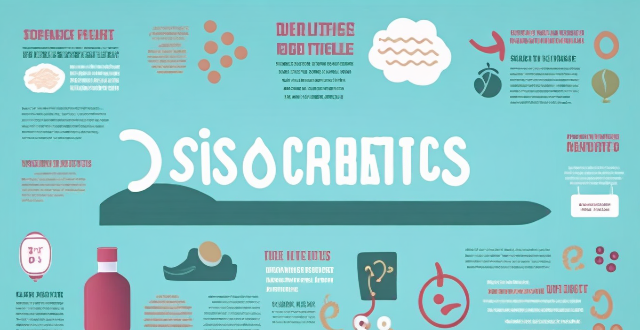
What role does nutrition play in preventing sports injuries ?
The text discusses the importance of nutrition for athletes, focusing on how a well-balanced diet can help prevent sports injuries. It highlights the key nutrients necessary for injury prevention, such as protein for muscle repair and growth, carbohydrates for energy production, healthy fats for joint health, and vitamins and minerals for overall health. The text also emphasizes the importance of hydration and meal timing for optimal performance and injury prevention.

What are the best foods to eat before and after a workout ?
Eating the right foods before and after a workout can significantly impact your performance and recovery. Before exercising, opt for easily digestible carbohydrates like whole grain bread or bananas for energy, and include some protein such as Greek yogurt to prevent muscle breakdown. After your workout, focus on replenishing lost nutrients with proteins from lean meats or eggs, and carbohydrates from quinoa or fruits to aid recovery. Hydration is key both before and after exercise; water and coconut water are great choices for maintaining fluid balance. Avoid heavy, fatty, or spicy foods before working out, and steer clear of alcohol and processed foods post-workout.

How can nutrition affect an athlete's performance ?
Nutrition plays a pivotal role in an athlete's performance, providing essential energy, aiding recovery, and maintaining overall health. A balanced intake of macronutrients, such as carbohydrates for immediate energy, proteins for muscle repair and growth, and fats for long-term energy, is crucial. Micronutrients like vitamins and minerals also contribute to metabolic functions and electrolyte balance. Hydration is vital for fluid balance and preventing performance decline due to dehydration. Timing of nutrient intake, before, during, and after exercise, significantly impacts performance and recovery. Strategic dietary planning, including periodized nutrition and anti-doping compliance, ensures athletes meet their specific needs and maintain clean sport standards. Overall, a well-structured nutritional plan can enhance athletic performance and success in sports.

How do I make a bento box meal ?
How to make a bento box meal with rice, protein, vegetables, and garnishes. Includes steps for cooking rice, preparing protein, cutting vegetables, assembling the bento box, and packing it for later enjoyment.

How long should I wait before eating after a workout
The amount of time one should wait to eat after a workout depends on individual needs and goals. It's important to replenish nutrients lost during exercise, especially after strenuous workouts, by eating a meal or snack within 30 minutes to an hour post-exercise. This aids muscle recovery and provides energy for future workouts. Rehydration is also crucial, with water or sports drinks replacing fluids lost through sweat. Listening to your body's cues is key; if you feel lightheaded or unusually fatigued, it might be a sign to eat sooner. Aim for a balanced meal or snack containing carbohydrates, protein, and healthy fats for muscle repair and sustained energy. The "anabolic window," where muscles are most receptive to nutrients, is often cited as 30-45 minutes after exercise, but recent research suggests this window may be more flexible. Avoid heavy meals immediately after vigorous workouts; start with lighter options like smoothies or yogurt with fruit. Timing and personal goals should also be considered; weight loss seekers might opt to wait longer to eat, while muscle builders should prioritize protein and carbs sooner. Ultimately, what works best varies from person to person, so it's essential to listen to your body and adjust accordingly.
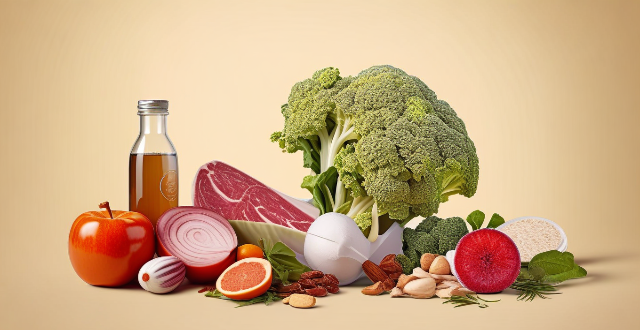
What kind of carbohydrates should I include in my fitness meal plan ?
In fitness meal planning, carbohydrates are crucial for energy during workouts and muscle recovery. Complex carbs like whole grains and legumes provide sustained energy and nutrients. Simple carbs should be limited to avoid spikes in blood sugar. Timing is key; consume complex carbs before workouts and a mix of protein and carbs afterward. Portion control is essential, with a general guideline of 45-65% daily calories from carbs. Personalized advice can be sought from a dietitian.
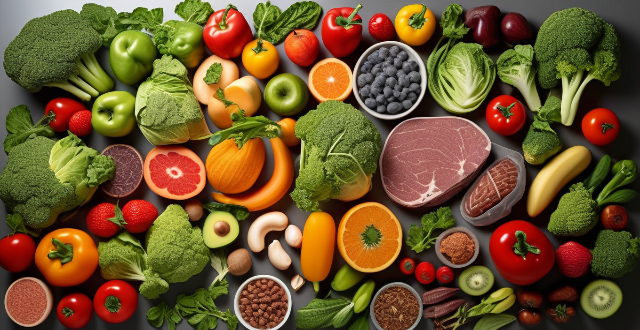
What is the ideal meal plan for an athlete's daily routine ?
An athlete's meal plan should include a variety of complex carbohydrates, lean proteins, healthy fats, and fruits & vegetables to support their training goals, optimize performance, and aid in recovery. The ideal meal plan includes breakfast with sustained energy sources like whole grains and fruits; snacks such as trail mix or protein shakes to keep energy levels steady; lunch focusing on lean proteins and leafy greens for muscle repair and nutrient replenishment; afternoon snacks like Greek yogurt or fruit smoothies to avoid energy crashes; dinner emphasizing lean proteins and complex carbs for muscle recovery and glycogen replenishment; and a pre-bed snack with slow-digesting protein and natural sleep aids like cherries or chamomile tea.